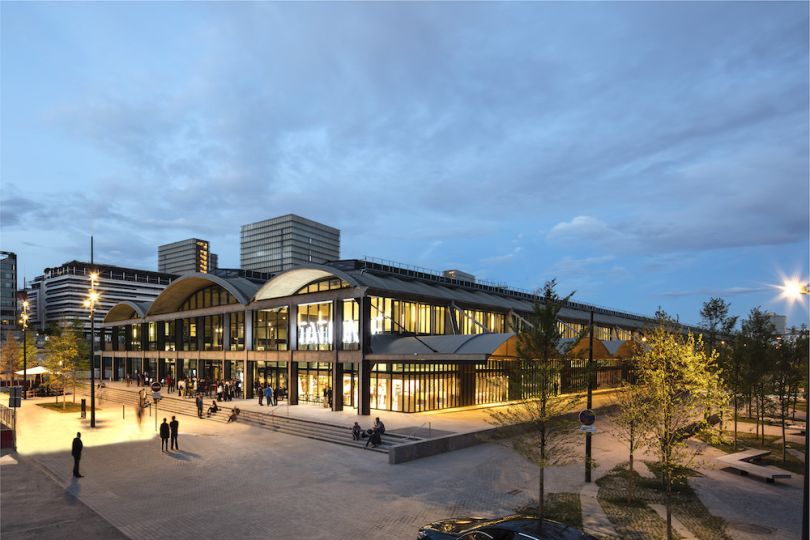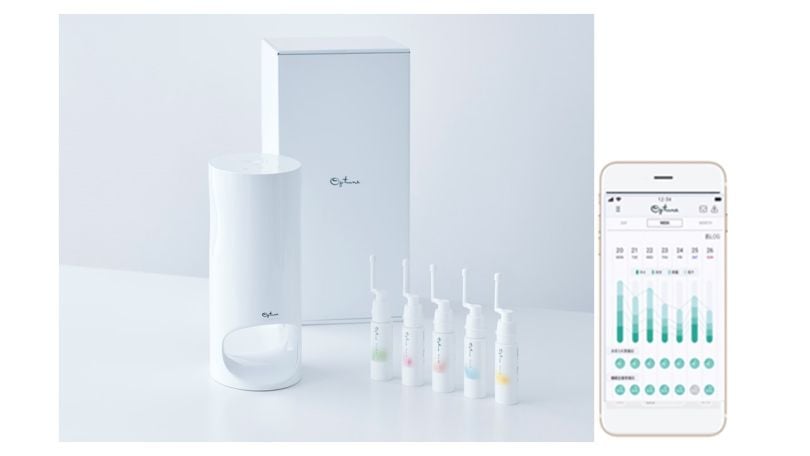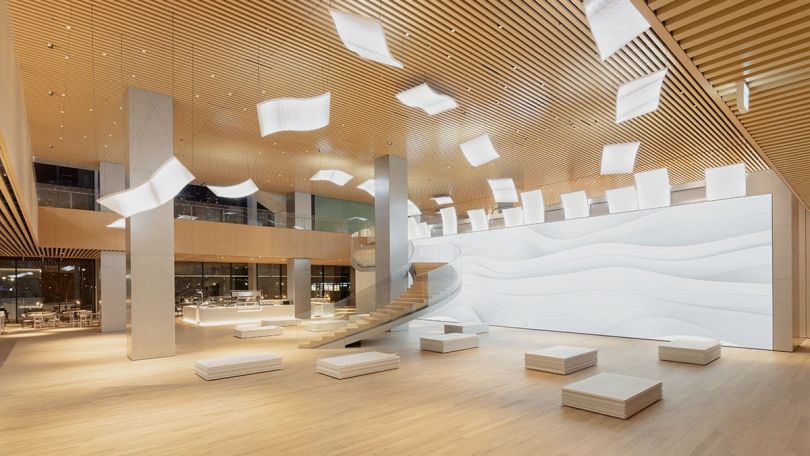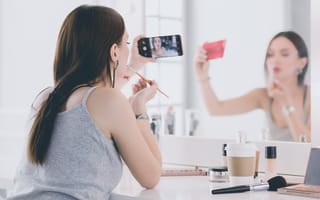At CES 2020, L’Oréal pulled the wraps off of Perso, a smart skincare device that uses artificial intelligence, location data and a user’s preferences to formulate personalized moisturizer. The device is set to go on sale some time in 2021, and when it does, it should also be able to create customized foundation and lipstick.
“We are committed to making L’Oréal the leader in beauty tech — and Perso is the next step in that exciting journey,” said Nicolas Hieronimus, the company’s deputy CEO, in a statement.
L’Oréal is far from the only company that’s big on beauty tech. Although beauty tech dates back to the days of boxed computer programs (Cosmopolitan magazine put its name on “virtual makeover software” all the way back in 1998), it’s only recently that big brands have started to invest heavily in the space. The surge in interest has been driven in large part by advances in smartphone technology and the growing threat of independent, digitally native beauty brands, which have grown market shares by leveraging social media, influencer marketing and eco-friendly practices.
For established brands, beauty tech represents an opportunity to connect with consumers in a new way — one driven by IoT and AI rather than YouTube and Instagram influencers. Augmented reality beauty apps let users try every type of lipstick a company makes in minutes without ever entering a store, while smart devices like Perso enable brands to offer personalized experiences at scale.
L’Oréal, Shiseido and Estée Lauder are three of the world’s biggest cosmetics companies, and they’re also some of the most active big brands in beauty tech. To get a better understanding of how technology is changing the cosmetics industry, we’re zooming in on these three companies and the progress they’re aiming to push.

The Next Generation Of Beauty Tech Startups
Station F became the world’s largest startup campus when it opened in 2017. The Paris-based facility, built inside a former railway depot and occupying a whopping 366,000 square feet, is home to more than 1,000 early-stage startups and corporate accelerators, including L’Oréal’s. L’Oréal’s beauty tech accelerator runs for six months, during which time startups are given office space at Station F, introductions to investors and access to the company’s distribution channels.
“The Kardashians have changed the market,” said Maxime Garcia-Janin, founder of customized fragrance startup Sillages Paris and an alumni of L’Oréal’s accelerator program, in an interview with Sifted. “The beauty market is changing really fast because of digital — it is changing all the rules. L’Oréal is working with startups like us to understand digital changes.”
In addition to working with startups, the French beauty brand is acquiring them outright. In 2018, L’Oréal purchased ModiFace, a Toronto-based tech company that specialized in augmented reality beauty apps whose clients included rivals like Shiseido, Estée Lauder and LVMH, the parent company of Sephora. Along with dealing a blow to its competition, ModiFace’s AI-powered skin diagnostic and facial analysis technology now underpins the Perso app.
“Our ultimate goal is to create products that consumers do not see as technology, but as something core to their daily lives.”
Perso was developed inside of L’Oréal’s technology incubator, which launched in 2012 and is staffed by physicists, engineers, UX specialists, hardware designers and data scientists. Prior to Perso, the team developed products like a wearable UV tracker, an AR mirror app and a smart hairbrush, built in partnership with French consumer electronics company Withings.
“Our ultimate goal is to create products that consumers do not see as technology, but as something core to their daily lives,” said Guive Balooch, head of L’Oréal’s tech incubator, in an interview with Authority Magazine.

creating a personal connection with smart devices
Shiseido sat out CES 2020, but that’s not because it didn’t have any new tech to showcase. In fact, Shiseido released its own smart skincare device, Optune, a full six months before CES which shares many similarities with Perso.
Both use artificial intelligence to analyze photos of a user’s face to detect skin conditions and pair that information with location-based weather and air pollution data to create a custom moisturizer. However, Optune can also factor in sleep data and information on a user’s stress levels and menstrual cycles into its formula. Optune is powered by technology from two tech companies acquired in 2017, MATCHCo and Giaran, and is available on a subscription basis for about 10,000 yen ($92) a month.
“There is still no [cosmetics] company that has been able to integrate personalization into their business models.”
Unlike L’Oréal, Shiseido didn’t declare its intention to become a leader in beauty tech upon launching Optune. Rather, it’s focusing on how technology can establish the brand as a leader in personalization.
“There is still no [cosmetics] company that has been able to integrate personalization into their business models,” said Shiseido president Masahiko Uotani in an interview with the Nikkei Asian Review. “If we lead in this field, we could beat global competitors that are larger than us.”
Products like Optune are designed and fine-tuned at Shiseido’s global innovation center, S/Park, located in Yokohama, Japan. For obvious reasons, many corporate innovation labs operate in secrecy and aren’t open to the public. Shiseido has taken the opposite approach, giving the public access to the first two floors of the complex. In addition to a museum, cafe and fitness studio, S/Park also gives visitors the ability to chat with researchers and experience the brand’s newest technology firsthand.

Although Shiseido hasn’t acquired a tech company since 2017, it is still active in the startup space. Its venture fund, Shiseido Venture Partners, has made four investments in two companies since its foundation in 2016, according to data from Crunchbase. Shiseido Venture Partners is also a limited partner in the Dreamers Fund, which was founded by Japanese soccer star Keisuke Honda and actor Will Smith. Similar to Optune, the company’s venture fund is focused on the impact technology can have on the end user.
“We’re very picky about which startups we want to invest in,” said Marc Rey, Shiseido’s chief growth officer, in a Q&A with Forbes. “The thing we’re most interested in is USP [unique selling proposition] and vision; they’re at least as important as the technology. It’s about what the technology can bring as a real change to the consumer.”
a makeup counter powered by social media
Chinese social media platform WeChat is a relatively unknown commodity in the United States. User statistics are hard to come by, but in July 2018 the platform reportedly had 2.47 million monthly active users in the United States. Five months later, WeChat announced that it averaged 1 billion daily active users worldwide. Despite not being big in America, WeChat has caught the attention of New York-based beauty brand Estée Lauder.
“WeChat is the major platform for us to drive online to offline.”
At the company’s MAC Shanghai store, customers book appointments, receive real-time recommendations from influencers and can pay for their purchases using WeChat. The store also offers virtual testing and allows customers to create custom products, 3D printed in-store.
“The brand engagement is through the platform [WeChat],” said Tricia Nichols, Estée Lauder’s former SVP of consumer marketing, in a 2017 interview with Jing Daily, which covers luxury consumer brands in China. “It helps convert people into customers. WeChat is the major platform for us to drive online to offline.”
Partnerships have been a large component of Estée Lauder’s early beauty tech strategy. The company previously partnered with Perfect Corporation, makers of the augmented reality YouCam Makeup app, to launch virtual lipstick testing as well as AR training programs for its in-store beauty advisors.
Although Estée Lauder has yet to launch a smart device, its tech department, which was previously spread across eight different offices in New York, was recently reorganized. Now there are two offices, one on Long Island and the other in nearby Queens. The Queens’ office plays home to Estée Lauder’s first innovation lab and also hosts a yearly hackathon, a 24-hour competition where students and professionals build technology designed to help boost the company’s sustainability and corporate citizenship efforts.
In an interview with CNBC, Michael Smith, Estée Lauder’s CIO, said the hackathon provides an opportunity for the company both to engage with the broader tech community and to augment its own innovation efforts.
“It’s important to understand there are times when transformation requires external support,” Smith told CNBC. “The ideas that are created during the hackathon are used to further our strategic vision within IT and bring in fresh, new ideas for our team.”
Unlike some established companies in other industries, L’Oréal, Shiseido and Estée Lauder don’t seem to harbor aspirations of becoming full-blown tech companies. For these three, and the beauty industry in general, technology serves as a means to an end, whether that’s to connect with consumers in new ways or provide more personalized products. But the pursuit of these goals is driving the beauty tech industry forward at a rate that could soon make digital-first makeup departments, AR beauty apps and smart skin care devices industry standards.




